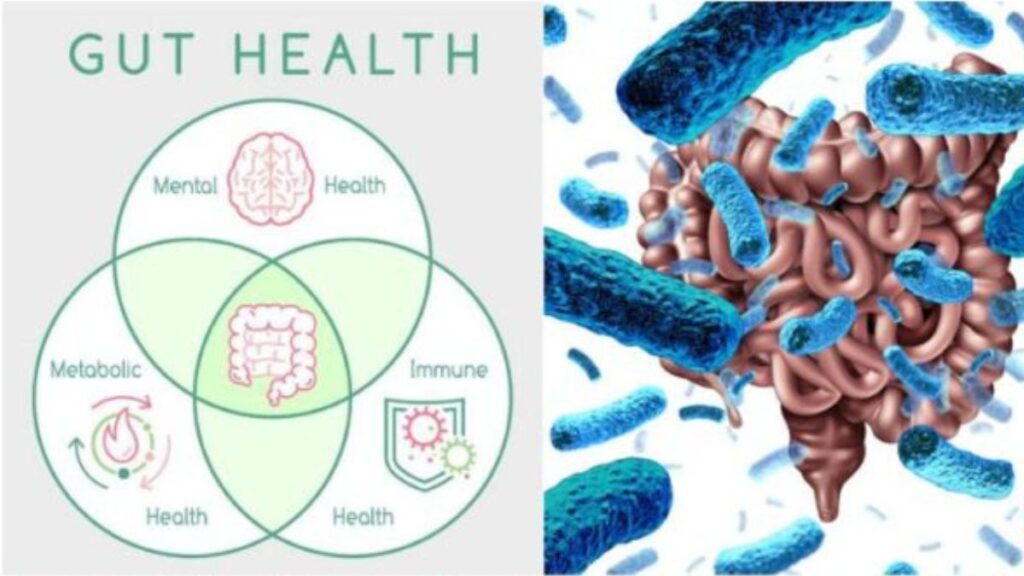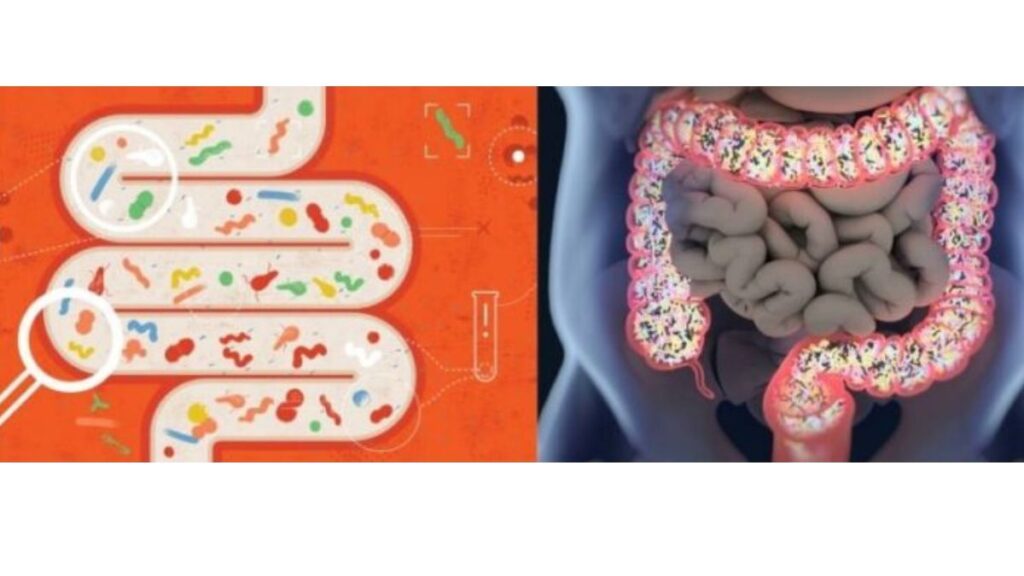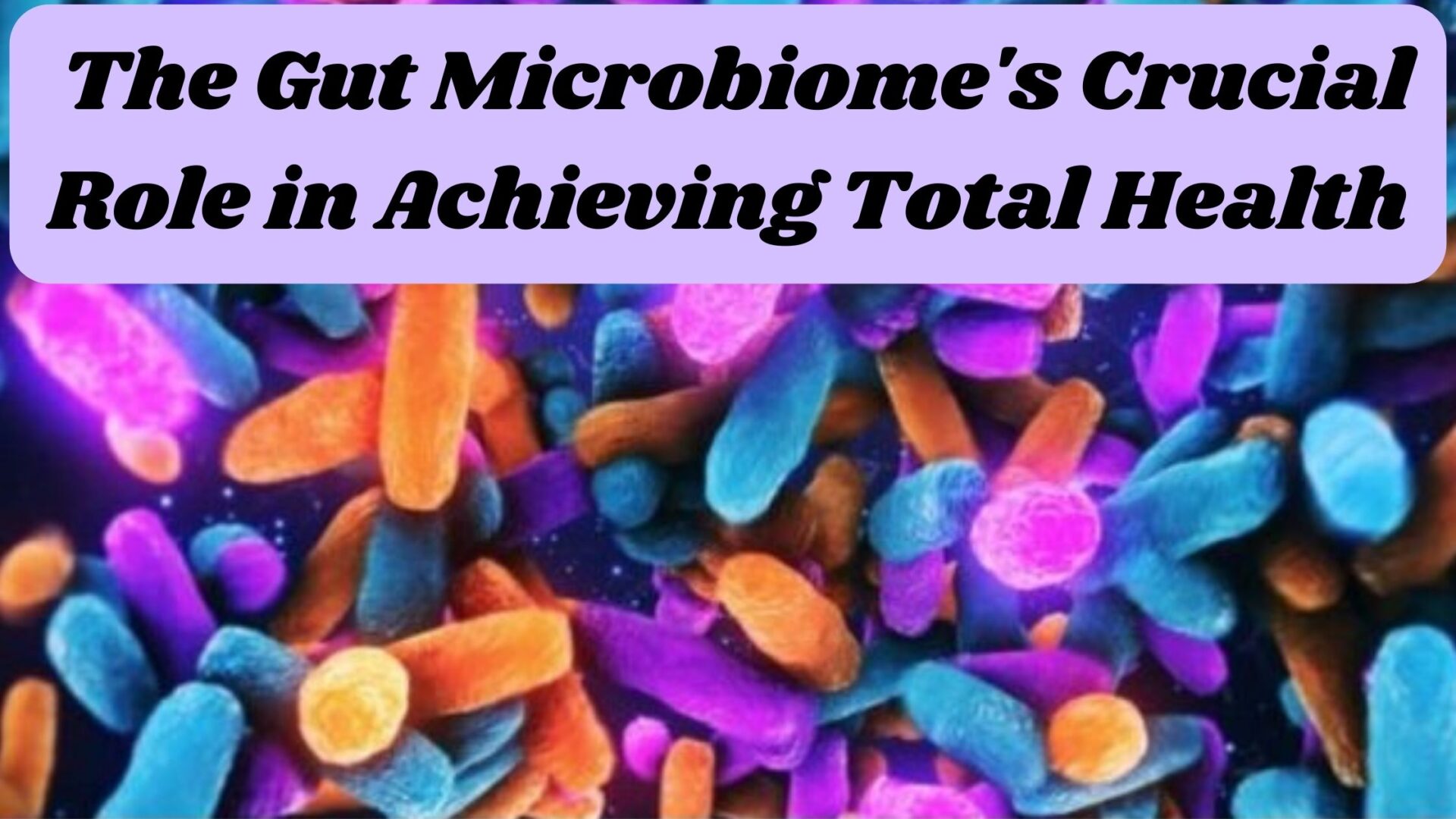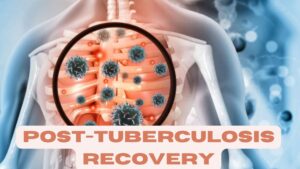Introduction:
Inside Out: Unveiling the Gut Microbiome’s Crucial Role in Achieving Total Health

In the intricate world of human biology, a microscopic community within us plays a pivotal role in shaping our overall health – the gut microbiome. This article delves into the fascinating realm of the gut microbiome, exploring its crucial role in achieving total health and well-being.
Understanding the Gut Microbiome’s :
The gut microbiome refers to the diverse community of trillions of microorganisms residing in our digestive tract. This complex ecosystem consists of bacteria, viruses, fungi, and other microbes, working in harmony to maintain a delicate balance. As research advances, scientists are uncovering the profound impact the gut microbiome has on various aspects of our health.
Digestive Health and Beyond:
One of the primary functions of the gut microbiome is aiding in digestion. Beneficial bacteria help break down food, extract nutrients, and maintain a healthy gut lining. However, its influence extends far beyond the digestive system. The gut microbiome plays a crucial role in immune function, metabolism, and even mental health.
Immune System Support:
A significant portion of the immune system resides in the gut, and the microbiome plays a key role in supporting its functions. A balanced and diverse microbiome helps regulate immune responses, defending against harmful pathogens while promoting tolerance to beneficial microbes. An imbalanced microbiome, on the other hand, may contribute to autoimmune conditions and other immune-related disorders.
Metabolic Impact:
Emerging research suggests a strong connection between the gut microbiome and metabolic health. The composition of gut bacteria can influence weight management, insulin sensitivity, and the risk of metabolic disorders such as obesity and type 2 diabetes. Maintaining a healthy balance of gut microbes may contribute to overall metabolic well-being.
The gut-brain axis, a bidirectional communication system between the gut and the brain, highlights the role of the gut microbiome in mental health. Imbalances in the microbiome have been linked to conditions like anxiety, depression, and stress. Probiotics and other interventions targeting the gut microbiome show promise in supporting mental well-being.
Maintaining a Healthy Gut Microbiome:
Several factors can impact the balance of the gut microbiome, including diet, lifestyle, and antibiotics. Consuming a diverse range of fiber-rich foods, fermented products, and prebiotics can promote a healthy microbiome. Regular exercise, sufficient sleep, and stress management also contribute to overall gut health.
What is the human microbiome and how does it affect our health?
The human microbiome is a vast and diverse community of microorganisms that inhabit various parts of the human body, including the skin, mouth, respiratory tract, and most prominently, the gastrointestinal tract. This complex ecosystem consists of bacteria, viruses, fungi, and other microbes, collectively playing a crucial role in maintaining health and influencing various bodily functions.
Key Components of the Human Microbiome:
- Gut Microbiome: The gut microbiome, located in the digestive tract, is particularly significant. It houses trillions of microorganisms, primarily bacteria, which contribute to the breakdown of food, nutrient absorption, and the synthesis of certain vitamins. A balanced gut microbiome is essential for digestive health.
- Skin Microbiome: The skin is home to a diverse array of microorganisms that play a role in protecting against pathogens and maintaining skin health. Disturbances in the skin microbiome can contribute to various skin conditions.
- Oral Microbiome: The oral cavity harbors a unique microbiome that is crucial for oral health. This microbiome contributes to the prevention of oral diseases and assists in the digestion process by breaking down certain compounds in the mouth.
- Digestive Health: The gut microbiome is integral to digestive processes. It helps break down complex carbohydrates, produces certain vitamins, and influences the absorption of nutrients. Imbalances in the gut microbiome have been linked to digestive disorders such as irritable bowel syndrome (IBS) and inflammatory bowel diseases (IBD).
- Immune System Regulation: The microbiome plays a vital role in training and regulating the immune system. A healthy and diverse microbiome helps the immune system distinguish between harmful pathogens and beneficial microbes. Imbalances can lead to immune system dysregulation and increase susceptibility to infections or autoimmune conditions.
- Metabolic Functions: Research suggests a connection between the gut microbiome and metabolic health. The composition of gut bacteria can impact metabolism, insulin sensitivity, and the risk of metabolic disorders such as obesity and type 2 diabetes.
- Mental Health: The gut-brain axis, a bidirectional communication system between the gut and the brain, highlights the influence of the gut microbiome on mental health. Imbalances in the microbiome have been associated with conditions like anxiety and depression, emphasizing the link between gut health and mental well-being.
Maintaining a Healthy Microbiome:
Several factors can influence the composition and balance of the human microbiome:
- Diet: A diverse and fiber-rich diet supports a healthy microbiome.
- Probiotics and Prebiotics: These promote the growth of beneficial bacteria and contribute to microbial diversity.
- Avoiding Overuse of Antibiotics: Excessive antibiotic use can disrupt the balance of the microbiome.
Understanding the human microbiome and its intricate relationship with health is an evolving area of research. As scientists continue to explore this complex ecosystem, it becomes increasingly clear that nurturing a balanced and diverse microbiome is essential for overall well-being.
What contribution do probiotics and prebiotics make to microbial diversity in the intestinal microbiome?
Probiotics and prebiotics play important roles in shaping and maintaining microbial diversity in the intestinal microbiome.

- Probiotics: Probiotics are live microorganisms, usually bacteria or yeast, that confer health benefits when consumed in adequate amounts. When introduced into the gut, probiotics can contribute to microbial diversity by:
- Colonization: Probiotics can establish themselves in the gut, competing with potentially harmful bacteria for resources and space, thus promoting a more diverse microbial community.
- Enhancing Biodiversity: Probiotics may stimulate the growth and activity of other beneficial bacteria in the gut, leading to increased microbial diversity.
- Modulating Immune Responses: Probiotics can influence the immune system, promoting a balanced and responsive environment that supports a diverse range of microbes.
- Prebiotics: Prebiotics are non-digestible compounds, often fibers or carbohydrates, that promote the growth and activity of beneficial microorganisms in the gut. Prebiotics contribute to microbial diversity by:
- Selective Stimulation: Prebiotics are specifically fermented by certain beneficial bacteria in the gut, providing them with a substrate for growth. This selective stimulation helps these bacteria thrive and contribute to overall diversity.
- Production of Short-Chain Fatty Acids (SCFAs): The fermentation of prebiotics produces SCFAs, which serve as an energy source for various microbes, promoting their growth and diversity.
- Modulating Gut Environment: Prebiotics can create a favorable environment in the gut, influencing pH levels and promoting conditions that are conducive to the growth of diverse microbial species.
By combining the use of probiotics and prebiotics, a synergistic effect can occur, leading to a more balanced and diverse microbial community in the gut. This diversity is associated with various health benefits, including improved digestion, enhanced nutrient absorption, and a strengthened immune system. However, it’s important to note that individual responses to probiotics and prebiotics can vary, and more research is needed to fully understand their impact on the complexity of the intestinal microbiome.
Conclusion:
As we unravel the mysteries of the gut microbiome, it becomes evident that this microscopic community wields a significant influence on our total health. Nurturing a balanced and diverse gut microbiome through mindful lifestyle choices can pave the way to enhanced well-being, making ‘Inside Out’ a journey towards holistic health.
FAQs
- What is the gut microbiome?The gut microbiome refers to the diverse community of microorganisms, including bacteria, viruses, fungi, and archaea, that reside in the gastrointestinal tract. It plays a crucial role in digestion, nutrient absorption, metabolism, immune function, and overall health.
- How does the gut microbiome affect total health?The gut microbiome influences various aspects of health, including digestion, metabolism, immune function, mental health, and even weight regulation. It interacts with the body’s systems, impacting everything from nutrient absorption to inflammation levels.
- What factors can influence the gut microbiome?Several factors can shape the composition and function of the gut microbiome, including diet, lifestyle, genetics, medications (such as antibiotics), stress, and environmental exposures.
- How can diet impact the gut microbiome?Diet plays a significant role in shaping the gut microbiome. A diet rich in fiber, fruits, vegetables, and fermented foods can promote a diverse and healthy microbiome. Conversely, a diet high in processed foods, sugars, and saturated fats may negatively impact microbial diversity and health.
- Can the gut microbiome affect mental health?Emerging research suggests a strong connection between the gut microbiome and mental health. The gut-brain axis, a bidirectional communication system between the gut and the brain, influences mood, stress response, and cognitive function. An imbalance in gut bacteria has been linked to conditions like depression, anxiety, and even neurodegenerative diseases.
- How can I support a healthy gut microbiome?Maintaining a balanced diet rich in fiber, consuming probiotics and fermented foods, managing stress, getting regular exercise, and avoiding unnecessary antibiotic use are some strategies to support a healthy gut microbiome.
References:
- Lynch, S. V., & Pedersen, O. (2016). The human intestinal microbiome in health and disease. New England Journal of Medicine, 375(24), 2369-2379.
- Cryan, J. F., & Dinan, T. G. (2012). Mind-altering microorganisms: the impact of the gut microbiota on brain and behaviour. Nature Reviews Neuroscience, 13(10), 701-712.
- Sonnenburg, J. L., & Sonnenburg, E. D. (2019). The ancestral and industrialized gut microbiota and implications for human health. Nature Reviews Microbiology, 17(6), 383-390.
- Rinninella, E., Raoul, P., Cintoni, M., Franceschi, F., Miggiano, G. A. D., Gasbarrini, A., & Mele, M. C. (2019). What is the Healthy Gut Microbiota Composition? A Changing Ecosystem across Age, Environment, Diet, and Diseases. Microorganisms, 7(1), 14.
- Singh, R. K., Chang, H. W., Yan, D., Lee, K. M., Ucmak, D., Wong, K., … & Liao, W. (2017). Influence of diet on the gut microbiome and implications for human health. Journal of Translational Medicine, 15(1), 73.








